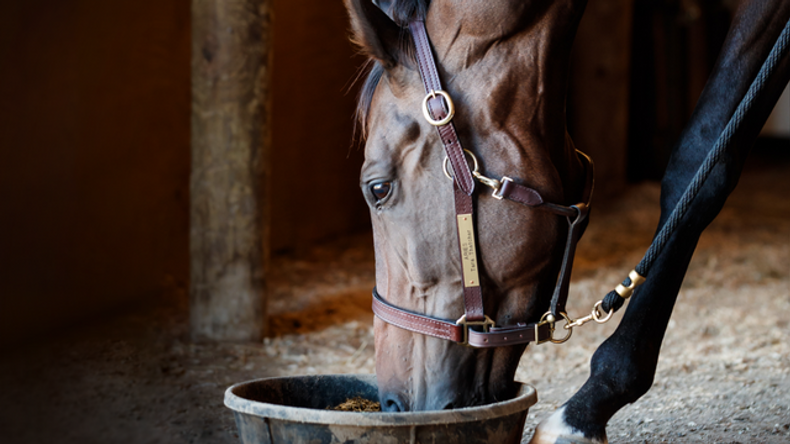Q: Many people think that beet pulp MUST be soaked, but is that true?
A: Although it is common to soak beet pulp, it is *not necessary* to soak beet pulp for a healthy horse.
In fact,the American Association of Equine Practitioners reported that in studies where horses ate a diet up to 45% total beet pulp, no ill effects were observed! (yep, their stomachs did not explode) ?
Some horses may have dental, digestive, or esophageal conditions that require their feeds to be wet down, but, if your horse has a healthy set of teeth & no other issues - dry pulp is safe!
*If you prefer to soak - follow these steps to get the best nutritional bang for your buck! ?
- Use twice as much water as beet pulp.
- Cool or warm water is fine, but avoid HOT water, as this will “cook” nutrients out of the feed!
- Soak in small batches. Soaked pulp will be good for about 24 hrs in the summer, up to 48 hrs in the winter before it begins to ferment.
Q: Fermen-what?
A: The “cool” feature of beet pulp is its ability to undergo fermentation in your horse's digestive system.
Fermentation may sound complex, but it's like a biological magic trick where the fiber in beet pulp transforms into highly usable energy. While regular foods get digested quickly, beet pulp stays around, ensuring your horse has a consistent and enduring energy supply. ✨
Feeding your horse beet pulp is like providing them with a specialized energy source that releases its power slowly and steadily throughout the day.
This makes beet pulp an excellent choice for horses that require sustained energy levels and extended digestion time; such as seniors and ulcer-prone horses.
Q: Can beet pulp help my horse stay hydrated?
A: Certainly!
Horses naturally balance their hydration by seeking water when they eat dry or concentrated feeds. Beet pulp, while not a substitute for free water access, can stimulate your horse's instinct to drink, ensuring proper digestion and overall hydration. It's like when you eat a dry saltine cracker, and you suddenly want a sip of water to help it go down smoothly.
This is especially valuable for "picky drinkers" or horses at risk of dehydration. When you feed beet pulp soaked, it absorbs water like a sponge, aiding in rehydration for horses that may not be drinking enough.
Dry or soaked, beet pulp can be a helpful tool to keep your horse properly hydrated!
Q: Can I feed beet pulp to my senior horse?
A: Absolutely!
The softened texture of beet pulp is a fantastic choice for senior horses, especially if they have dental problems or difficulty chewing. When dental issues arise, many senior horse owners soak beet pulp-based feeds to create a mash that's easier to eat.
Furthermore, beet pulp offers a concentrated source of fiber and energy. As horses age, their digestive systems may become less efficient. Beet pulp's fiber helps in maintaining digestive health, making it easier for seniors to get the most out of their meals and stay in good shape during their golden years!
Q: My horse is overweight, can I feed beet pulp?
A: Of course!
Beet pulp is a wise choice for overweight horses. Its high-fiber content makes horses feel full, reducing their urge to overeat and aiding in weight management.
Moreover, beet pulp can serve as a helpful way to give your horse supplements without adding extra calories to their diet. This means you can provide essential vitamins and minerals without increasing the risk of weight gain, helping your horse maintain a healthy balance.
Q: What does “good” beet pulp look like?
A: In a nutshell, it can look different!
Beet pulp can come in various sizes, shapes, and colors, a bit like how potatoes in the grocery store don't all look the same but are equally nutritious. The key thing to know is that the nutrition remains consistent.
Several factors affect the appearance of beet pulp, including where it's grown, how it's harvested, and the time of the year it's processed. These variations in appearance don't change the quality, making beet pulp a reliable and flexible option for your horse's nutrition.
Q: Is beet pulp safe for a horse with Cushings?
A: Generally, yes!
Due to its low sugar and starch content, beet pulp is considered a safe feed option for horses that are insulin-resistant, have metabolic conditions such as Equine Metabolic Syndrome (EMS), or are prone to laminitis.
While many horses with metabolic challenges do well on forage and a ration balancer, beet pulp can be fed when a horse needs more calories than forage alone can provide.
Q: What’s the difference between beet pulp based feeds and grain-based feeds?
A: Research has shown that beet pulp supports a healthy horse gut by providing easy-to-digest fiber that produces beneficial volatile fatty acids (VFAs).
VFAs are tiny energy molecules made when a horse digests healthy food, helping them feel good and keeping their gut working right.
In contrast, grain-based feeds are often high in sugars and starches (NSC), and can disrupt the hindgut microbial balance. This disruption can potentially cause issues like sugar rushes, hindgut acidosis, and colic.

